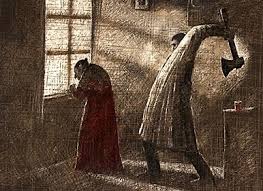Note: If you wish to receive, via e-mail, (1) my weekly newsletter or (2) daily copies of these posts, write to me at rrbates1951@gmail.com. Comments may also be sent to this address. I promise not to share your e-mail with anyone. To unsubscribe, write here as well.
Tuesday
Over the weekend Donald Trump, with his flair for the grandiose, quoted Napoleon in what some are calling the most frightening presidential pronouncement in history: “He who saves his country does not violate any law.” Napoleon, of course, hijacked the French government, became dictator and emperor, upended Europe, and ran his country into the ground.
Reader Luke Ross, a political science major, recently reminded me that, back in August of 2017, I wrote a blog essay comparing and contrasting Trump to Raskolnikov in Fyodor Dostoevsky’s Crime and Punishment. While I didn’t mention that the axe-murdering protagonist has a Napoleonic complex, it seems time to mention that now.
To be clear, in my essay I noted that there are more differences that similarities. True, both have a vision that they are superior to common people, believing they can run roughshod over all that is sacred: Raskolnikov kills an old pawnbroker just to prove to himself that he can while Trump is attempting to murder American democracy. But Raskolnikov is reflective and he has a conscience. This means that he is redeemable whereas I have seen nothing to indicate that Trump is salvageable.
But back to Napoleon. In one of his numerous diatribes, Raskolnikov regards the French leader as one of the greats who have murdered to achieve notable ends. In his own version of Trump’s “he who saves his country does not violate any law,” Raskolnikov says that
an ‘extraordinary’ man has the right… that is not an official right, but an inner right to decide in his own conscience to overstep… certain obstacles, and only in case it is essential for the practical fulfilment of his idea (sometimes, perhaps, of benefit to the whole of humanity).
Note the “perhaps” in his parenthetical comment, which is a weak attempt to justify his argument.
The argument doesn’t get stronger when Raskolnikov gets specific. He contends that Kepler or Newton would have been right—indeed, would have been “duty-bound”—to eliminate “the dozen or the hundred men for the sake of making his discoveries known to the whole of humanity.” Of course, neither did so. Had he known of Josef Mengele, the Nazi doctor who performed medical experiments on life concentration camp victims, would he have the courage of his argument to applaud him?
He’s on more familiar ground when he cites political figures like Lycurgus, Solon, Mahomet, and Napoleon, who did in fact claim victims. In the following century, he could have cited fellow countrymen Lenin and Stalin. As he says of Napoleon et. al., they were “all without exception criminals.” He explains how:
Making a new law, they transgressed the ancient one, handed down from their ancestors and held sacred by the people, and they did not stop short at bloodshed either, if that bloodshed—often of innocent persons fighting bravely in defense of ancient law—were of use to their cause. It’s remarkable, in fact, that the majority, indeed, of these benefactors and leaders of humanity were guilty of terrible carnage. In short, I maintain that all great men or even men a little out of the common, that is to say capable of giving some new word, must from their very nature be criminals—more or less, of course. Otherwise it’s hard for them to get out of the common rut; and to remain in the common rut is what they can’t submit to, from their very nature again, and to my mind they ought not, indeed, to submit to it.
Later, confessing his crime to prostitute-with-heart-of-gold Sonia, Raskolnikov says, “I wanted to become a Napoleon, that is why I killed her…. Do you understand now?”
Sonia doesn’t.
What particularly bothers Raskolnikov, once he starts reflecting, is the wide gulf between a student who kills a feeble old lady and a general who (to use his summation) “storms Toulon, makes a massacre in Paris, forgets an army in Egypt, wastes half a million men in the Moscow expedition and gets off with a jest at Vilna.” The Russian student shudders at the contrast: “Napoleon, the pyramids, Waterloo, and a wretched skinny old woman, a pawnbroker with a red trunk under her bed…It’s too inartistic. ‘A Napoleon creep under an old woman’s bed! Ugh, how loathsome!’” He seeks to be great and ends up a hideous jest.
Which might be something that he and Trump actually have in common.
In his thinking, Raskolnikov may be drawing on Friedrich Nietzsche’s notion of the Übermensch, the figure who soars above the sheep-like masses. Trump, despite never having read Nietzsche (although he has read Hitler), has the same contempt for these masses, even (or especially) those who worship him. And they, like Napoleon’s Polish soldiers in War in Peace, are ready to commit suicide for their emperor.
If Trump were to read Crime and Punishment—not that it would ever happen—he would lambaste Raskolnikov for confessing what could be a perfect crime. In his view, you’re either on top or you’re a pathetic loser.


